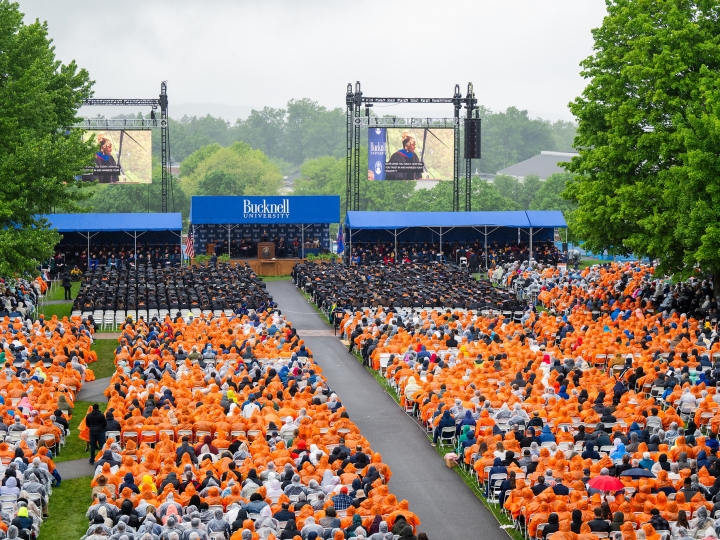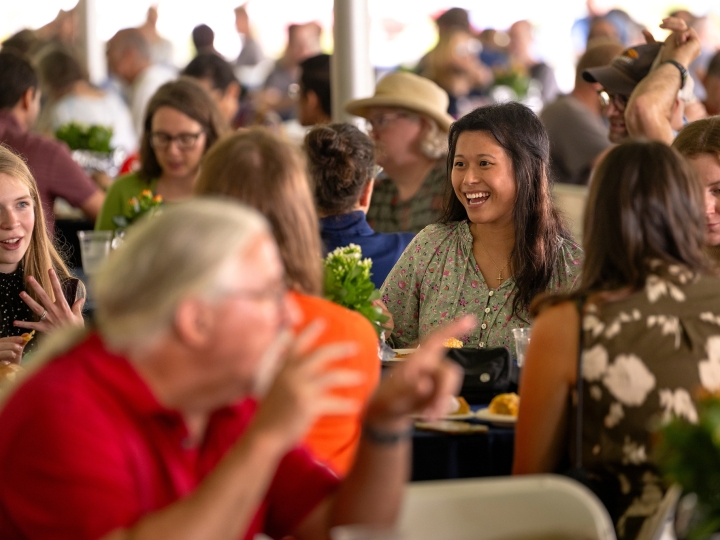
Kasich, Axelrod Find Common Ground in Bucknell Forum Discussion
March 1, 2023
David Axelrod (left) makes a point with John Kasich (right) and President John Bravman (center). Photo by Emily Paine, Communications
In many respects, Tuesday's Bucknell Forum discussion between former Ohio Gov. John Kasich and White House political strategist David Axelrod was the quintessential event in this year's "State of American Democracy" theme. President John Bravman moderated a civil discussion about the nation's political problems from the middle — with Kasich, the former Republican governor, to the right, and Axelrod, the former Democratic strategist, to the left.
Their theme — for both the talk and in an earlier meeting with nearly 20 students — centered on the notion that they didn't have to agree on politics to have a civil discussion on how best to solve the nation's problems. But for the country to return to greater bipartisanship, we may need to leave our political silos.
"That's the way it used to be and it will come back, but we’re going to have to get out of our silos," said Kasich, who also served in Congress from 1982 to 2000. "I trust that people are pretty intelligent in this country and they know what works and what doesn't work and over time, I think the political pendulum will swing back."
He cited the split outcome in the nation's recent midterm elections as a victory for moderation.
Profiting Over Political Outrage
But Axelrod contends that the moderate voice may be getting drowned out today by the louder more profitable voice of political outrage.
"I think there's something different about the [political] swings we're experiencing now," he said. "I think we have misaligned incentives in both our media environment and in our politics. There is profit in division. There is profit in outrage. Those silos are in many ways created for us by algorithms of social media platforms."
In order to restore political civility, Axelrod stressed a need to start seeing the humans among our political opponents.
"We have to see the humanity in each other, and too often, our politics prevents that," he said. "I think if we could do that, our democracy would be stronger and our country would be stronger."
Possibly the hardest question Kasich and Axelrod faced was by Michael Taromina ’26, a Bucknellian reporter, who asked why Gen Z college students should care about the state of American democracy.
Ultimately, both agreed that the problems students have already experienced should give them more reason to participate in the democratic process.
"You guys have grown up at a time when there are a lot of examples where democracy has gone sideways, and problems that you feel passionately and deeply about go unresolved or even worsened," said Axelrod, a CNN political analyst. "I don't think you want to surrender your ability to affect change, as hard and as difficult as it may be, and throw your lot on the good graces of some autocrat. The history of that is very bleak."
Greater Focus on Cultural Issues
Some of those problems are also hitting closer to home as political culture wars have reemerged around issues like school curriculums and library books. That's a real concern for Kasich.
"My concern about the Republican party is that some of the tried-and-true things the conservatives stood for — government as a last resort, not as a first resort; low taxes; common-sense regulations; and a variety of other reform measures — you don't hear much about that now," he said. "It's about a lot of cultural issues that I think are there to divide."
Axelrod also expressed some displeasure in the direction his party has taken away from rural America.
"What I've seen is that the Democratic party has become more of a suburban sort of a highly educated party, and maybe there's an unintended disdain for rural people, for people of faith, for people who work with their hands and their back," he said. "It's almost like we will help you, but we don't necessarily respect you. And I think that message has made [former President] Trump's job easier."
The former president is one of the handful of candidates who have already announced their intention to run in the 2024 presidential election. The long presidential selection process was a popular topic during the day. And being on a college campus, Axelrod made this educational comparison.
"Presidential elections are like very rigorous oral exams for the toughest job in America," he said.
The final speaker in The Bucknell Forum this year will be Barbara F. Walter '86, a leading scholar of civil wars and the author of New York Times bestseller How Civil Wars Start (and How to Stop Them), who will speak Tuesday, April 4, in Trout Auditorium.

